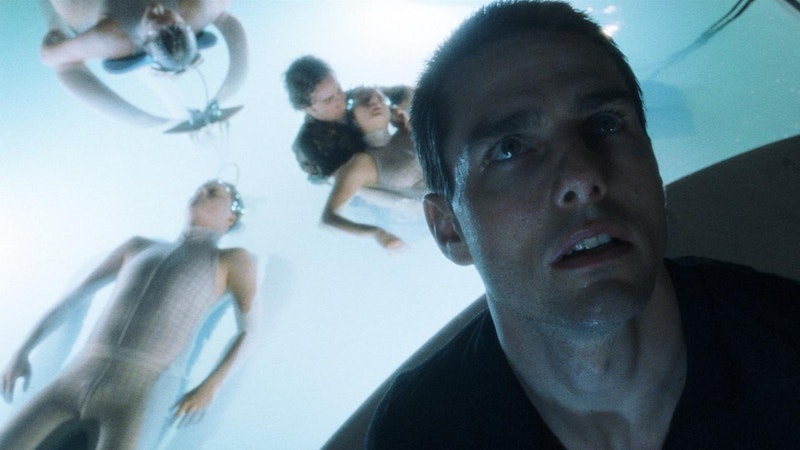Around a year ago I was working on an extensive project parsing through the ways Philip K. Dick’s literature is almost completely misinterpreted in all but a handful of adaptations. It started with the distinct lack of religiosity in Ridley Scott’s all-too-noirish take on Do Androids Dream of Electric Sheep? and runs all the way to the godawful prestige TV present of The Man in the High Castle (2015-19) and the truly horrendous Black Mirror-ripping anthology series Electric Dreams (2017-18).
One of the strangest and most egregious is Steven Spielberg’s fully reappraised Minority Report (2002), which transposed the surveilled world of early Patriot Act America into the 2050s, where precognitive psychics are used by the “precrime” police to stop murders before they happen. It came at a transitional point in Spielberg’s career, where he was moving away from being both the genre and awards darling of modern Hollywood, and into an increasingly personal and deeply odd string of films praised for their auteur sensibilities almost exclusively (at the time) by the French. Minority Report is no exception, and while well-received critically and at the box office, it highlights some of Spielberg’s weirder tendencies while also muting the qualities of Dick’s writing that so many other filmmakers have also avoided.
In Spielberg’s future, not much has changed except for now there are precogs helping put an end to violent crime and there’s an equally magical updating to America’s highway infrastructure. It keeps the context of the early-Bush years thinly-veiled, that world of increasing surveillance in the name of psychotic justice. Spielberg’s is a wrong-man narrative, a Hitchcockian thriller of twisting exoneration, as the careful machinations of a man’s life come crashing down against him.
While the narrative of Spielberg’s film is ostensibly a series of questions about the nature and justifications of policing—the conspiracy at its center is ultimately one not made of inherent flaws of the new precrime system which has been built, but of the corruption laid to that system by its architects. Tom Cruise’s pre-crime cop Anderton finds himself running round a galaxy-brained caper where his underlings try to stop him from committing a murder he doesn’t yet understand. It’s a classic setup with a cyberpunk twist: we know what’s going to happen (or do we?) just not what the thrilling interim will look like. And it's rife with the typically Spielbergian broken family narrative and savant-y camerawork that’s both stunning to behold in its mise-en-scene and blinding in its bleach-bypassed post-processing. It’s also concerned with systems.
Despite so much of his fiction taking influence from crime novels and examining machinations of authoritarianism, it would be wrong to say that Philip K. Dick has a sense of systems analysis. In fact, that’s precisely what he’s not interested in, it’s what he’s trying to get attention away from. Dick’s dualistic Gnosticism always emphasizes that divided between the corporeal, which he finds illusory, and the divine, which is both immanent and hidden. In his “The Minority Report” the conspiracy is real, but it’s also prophetic—it’s about unraveling the secret truths behind the universe, it’s about secret soldiers of knowledge that have seen past the veil and understand the true nature of God against the perceptions of the earthly world. While it's not explicit, “The Minority Report” is as much about Manicheans meeting in the desert or Cathars hiding their heresies from Church inquisitors.
One could argue that Spielberg was updating Dick’s story for the time he was living. But the context within which Dick existed was never Dick’s main concern, and Dick not focusing more on the present (which, again, was a concept he believed to be illusory, basically invented by the Devil himself) might’ve made him actually lose popularity as a writer. It’s what gave the old religious nut a cult, though. Dick’s focus on cosmic questions make Spielberg’s reformers-guide-to-the-world genuinely terrifying. At the end of Minority Report, all is solved, criminals are exonerated, the world has been fixed through systemic change—perhaps a sentiment Spielberg thought people in 2002 needed to hear, and it's a sentiment he told audiences in 1993 and again in 2012. But when Dick sees the whole of human history as Platonic cave, it makes a Spielbergian happy ending feel like the work of the Devil.

